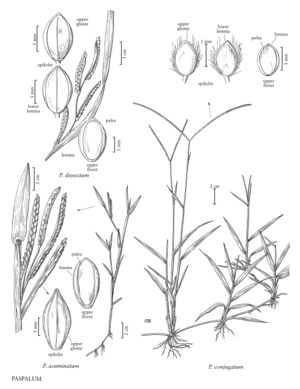Difference between revisions of "Paspalum conjugatum"
imported>Volume Importer |
imported>Volume Importer |
||
| (One intermediate revision by the same user not shown) | |||
| Line 39: | Line 39: | ||
|publication year= | |publication year= | ||
|special status= | |special status= | ||
| − | |source xml=https:// | + | |source xml=https://bitbucket.org/aafc-mbb/fna-data-curation/src/200273ad09963decb8fc72550212de541d86569d/coarse_grained_fna_xml/V25/V25_1447.xml |
|subfamily=Poaceae subfam. Panicoideae | |subfamily=Poaceae subfam. Panicoideae | ||
|tribe=Poaceae tribe Paniceae | |tribe=Poaceae tribe Paniceae | ||
Latest revision as of 17:57, 11 May 2021
Plants perennial; stoloniferous. Culms 15-80 cm, erect; nodes glabrous. Sheaths glabrous, pubescent distally; ligules 0.5-0.8 mm; blades 7-23 cm long, 1.5-8 mm wide, flat. Panicles terminal, usually composed of a pair of branches, a third branch sometimes present below the terminal pair; branches 2.5-12.7 cm, diverging to spreading, often arcuate, persistent; branch axes 0.2-0.8 mm wide, glabrous, margins scabrous, terminating in a reduced spikelet. Spikelets 1.3-1.9 mm long, 0.8-1.1 mm wide, solitary, appressed to the branch axes, ovate, stramineous. Lower glumes absent; upper glumes pilose on the margins, veinless or 2-3-veined; lower lemmas glabrous, veinless or 2-3-veined; upper florets whitish to golden yellow. Caryopses 0.9-1.1 mm, white to yellow. 2n = 18, 20, 40, 80.
Distribution
Puerto Rico, Tex., La., Utah, Ala., Pacific Islands (Hawaii), Miss., Virgin Islands, Fla.
Discussion
Paspalum conjugatum is native to tropical and subtropical regions of both the Western and Eastern hemispheres, including the Flora region. It grows in disturbed areas and at the edges of forests, and is sometimes used as a lawn grass.
Selected References
None.
